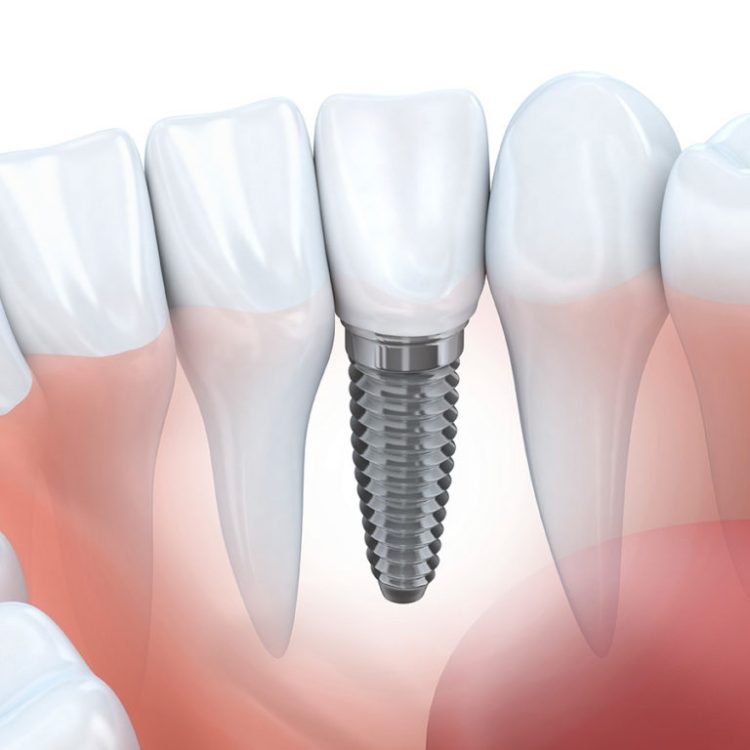DENTAL IMPLANTS
Dental implants represent a common procedure of permanently replacing missing teeth without affecting neighboring teeth.
Dental implants are the best way to replace missing teeth and they are designed to provide a foundation for replacement teeth that look, feel and function like natural teeth. They offer a variety of ways to replace teeth and give patients the confidence to eat anything and smile completely. Implants are made of titanium and they are similar in size and shape of a patient’s natural roots. The implants can support one crown, multiple crowns or provide stability to dentures.
The benefits for implants versus dentures or bridges are that they do not decay, offer great esthetics and are stronger than the other options. Furthermore, when teeth have been missing over a long period of time, the bone gradually decrease, but placing implants help to prevent that deterioration from occurring. Another benefit of implants is that they help preserve the remaining natural teeth which take on extra force because some teeth are missing. Lastly, the previous way to replace a missing tooth was to place a bridge, which required cutting the surrounding teeth and using them as the support for the bridge. With one single implant there is no need to touch the adjacent teeth, thus protecting them.

At Family dentistry of Upper Marlboro, we will evaluate the areas of missing teeth and take X-rays to evaluate the amount of bone present. We may recommend a CT scan to evaluate further if more may be required for implant placement, as well as to measure the size of implant that can be successfully placed at the site. Following 4-6 weeks of healing, impressions can be taken to begin working on making the crown or dentures to replace the missing teeth. Multiple implants can be connected to make a bridge or to support full dentures or partial dentures, making them more stronger and preventing them from moving around.
-
Permanent solution
-
Improved chewing and speaking
-
Natural function and look
-
Improved facial appearance
-
Prevention of bone loss
-
No special care required
-
Very sturdy and secure
-
No diet restrictions
-
Can be changed or updated
Common Questions
Dental implants are prosthetics that replace the root structure of a missing tooth. Made from the metal titanium, a dental implant resembles a small screw. Its ridged texture and titanium composition is ideal for osseointegration, which is the process where bone integrates around metal prosthetics. Osseointegration is what stabilizes implants so that they can support prosthetics like crowns and bridges. Proper stabilization also means that an implant is incredibly durable and will have a long lifespan.
Most people who are candidates for dental implants are healthy enough to undergo and heal from oral surgery. They should also have healthy gums and adequate bone density to support the dental implant. Some patients may require preliminary treatments such as periodontal therapy or bone grafts prior to dental implant placement. The only way to be certain if a patient is a candidate for implant dentistry is for our team to perform a comprehensive oral examination that includes diagnostic images to evaluate the health of the entire oral cavity’s tissues.
The price of dental implants varies based on a few factors such as if a patient requires preliminary treatments or if one needs multiple implants. We recommend discussing the price of implants with our knowledgeable staff since everyone’s situation is unique. Our practice accepts dental insurance and credit cards.
Dental implants are placed in the jawbone through an outpatient, same-day surgical procedure. When placing dental implants, our periodontist takes precautionary measures to ensure that our guests have a comfortable and positive experience. Local anesthetics along with sedatives and other pain relieving medications might be used.
Benefits
Compared to other tooth replacement methods, dental implants offer distinctive benefits. Since dental implants function very much like biological teeth, they will last for decades, if not the rest of the recipient’s life. Anchored by the bone, implants and the restorations they hold will not move during oral function as prosthetics like dentures tend to do.
Dental implants are cared for like natural teeth; this means that patients will brush and floss as normal. Special soaking solutions are not needed. Lastly, implants prevent the natural process of bone deterioration by keeping the jawbone stimulated.


